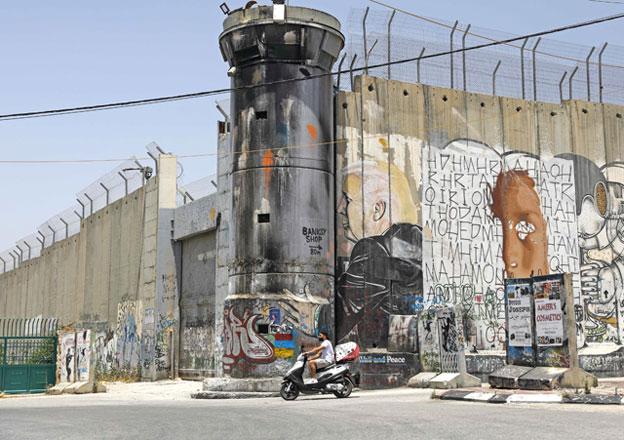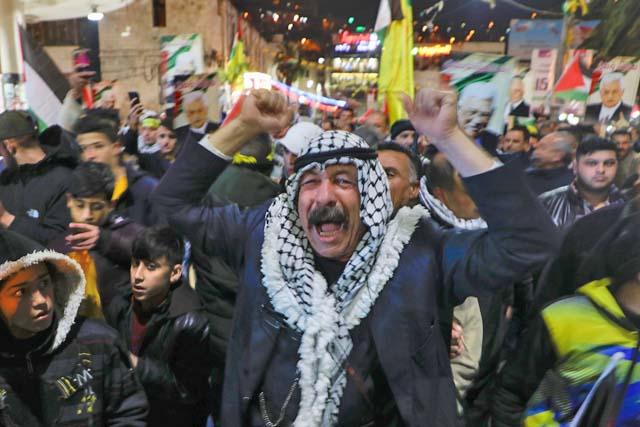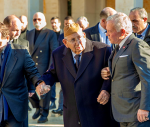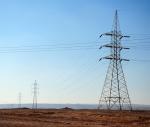You are here
Abbas says Palestinians cutting all ties with Israel, US
By AFP - Feb 01,2020 - Last updated at Feb 01,2020

A Palestinian demonstrator uses a slingshot during confrontations with Israeli soldiers following a protest against a US peace plan proposal, at the northern entrance of the West Bank city of Ramallah, on Saturday (AFP photo)
CAIRO — Palestinian President Mahmoud Abbas announced Saturday a cut of all ties with Israel and the United States, including security cooperation, after Washington unveiled a controversial Middle East plan seen as favouring Israel.
Abbas has made similar declarations multiple times before and it was not immediately clear what it would mean in practice.
His comments came as the Arab League rejected US President Donald Trump's plan, which had been met with fury by Palestinians.
"We are informing you that there will be no relations with you [Israel] and the United States, including on security cooperation," Abbas said at an extraordinary meeting of the pan-Arab bloc in Cairo.
The Palestinian leader said the move followed the "disavowal of signed agreements and international legitimacy" by the US and Israel.
Israel will have to “bear responsibility as an occupying power” for the Palestinian territories and Palestinians will press ahead with resistance using peaceful means, he said.
Abbas made a similar declaration in July 2017, announcing the suspension of security coordination with Israel during a major dispute over the flashpoint Al Aqsa Mosque compound in occupied Jerusalem.
It was resumed later that year, though the chief of the Palestinian police said that even during the suspension they had maintained regular contact, with 95 per cent of the activities continuing.
“The only thing we stopped is we didn’t meet them in the field,” Hazem Atallah said at the time.
‘Minimum rights’
The Cairo meeting brought together senior Arab officials, including Saudi Arabia’s foreign minister and the United Arab Emirates’ minister of state for foreign affairs.
Arab League chief Ahmed Aboul Gheit said the US plan was tantamount to creating “a one state with two categories of people, meaning an apartheid system, as it makes Palestinians second class citizens”.
“It is our right to accept or reject [the plan]... though the American proposal in reality appeared to be a dictation, or an offer that cannot be rejected or even discussed,” he added.
The Arab League rejected Trump’s plan, saying it failed to meet “the minimum rights and aspirations of Palestinian people” in a statement released after the meeting.
Arab leaders also vowed “not to... cooperate with the US administration to implement this plan”.
They insisted on a two-state solution that includes a Palestinian state based on borders before the 1967 war — when Israel occupied the West Bank and Gaza — and with East Jerusalem as its capital.
The US plan suggests that Israel would retain control of the occupied city of Jerusalem as its “undivided capital” and annex settlements on Palestinian lands.
Trump said the Palestinians would be allowed to declare a capital adjacent to Israeli-occupied east Jerusalem.
He announced the plan on Tuesday flanked by Israeli Prime Minister Benjamin Netanyahu and in the presence of Arab ambassadors from Bahrain, Oman and the United Arab Emirates.
Other Arab states gave carefully worded initial responses to the plan, which was strongly rejected by Palestinian leaders.
Later on Saturday, Abbas met with Egyptian President Abdel Fattah Al Sisi, who called for direct negotiations between Israelis and Palestinians.
‘Violation of accords’
In Abbas’ comments, he had said the US plan was in “violation of the [autonomy] accords” launched in Oslo in 1993 by Israel and the Palestinians.
The accords included the creation of the Palestinian Authority, currently led by Abbas, and outlined delineations of the West Bank.
They were seen as key to Israeli-Palestinian peace process, which hit an impasse in the years following the signing.
The Trump plan also gives Israel the green light to annex the strategic Jordan Valley — constituting some 30 per cent of the West Bank — and all Israeli settlements, which number more than 200, including those in annexed East Jerusalem.
The settlements comprise to some 600,000 Israelis, but are considered illegal under international law.
Abbas said that while Israel would immediately start annexation, under the plan the Palestinians would have to wait four years, until they show “good will”, to get a limited state.
The Palestinian leader said he would go to the United Nations Security Council soon to call for an international conference to relaunch negotiations with Israel.
This would be under the auspices of the diplomatic Quartet comprised of the United States, the European Union, the United Nations and Russia, Abbas said.
“But we will not accept the US alone. We have tried it already,” he added.
Related Articles
RAMALLAH, Palestine — Palestinians have sent top mediators including the United Nations a response to the US plan which anticipates Israel a
UNITED NATIONS, United States — The United States has requested a closed-door UN Security Council meeting for Thursday at which President Do
WASHINGTON — President Donald Trump on Tuesday unveiled long-awaited details of a US plan for solving the Israeli-Palestinian conflict, warn

















